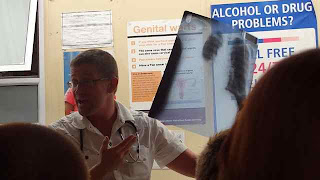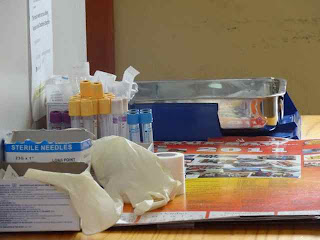Previously, the only reasons I thought were valid to wake up before the sun rises were for a soccer tournament or to catch a plane. Now I will add being rudely awakened by a giant swell and then getting to see the sun rise over Cape Town as we arrived to port. :0)
(That glazed over look is 100% authentic.)
The morning was a bit of a disappointment. I was supposed to go see the penguins on the coast with my friends but some questionable "planning" and my time constraints resulted in about an hour of walking and me abandoning the effort and heading back to the ship. We tried to find a train with no luck, then a taxi, then a train again and couldn't find any of the above. Still, it was nice to get off the ship and walk around a bit. I stopped by an ATM to get that out of the way too. I hadn't intended on walking that long or that far (I don't think some of the people I was with understood that I can't walk like they can. One of the drawbacks of "looking fine") so I was very glad to give the whole thing up and spend a few hours resting. (And finding creative ways to store my money apparently.)
(Just try to find my equivalent of $3 now thief! Muhahaha! I win this round!)
By the time I was supposed to meet for my field program, I was all ready and recharged. The field program was to a township (where black or colored people were made to live during Apartheid) to see what life was like and tour the medical clinic that worked with TB and HIV/AIDS patients. As you can imagine, I was expecting some really sad experiences out of this. I imagined the townships as places that people were forced to go and now can't get out of. Nothing like actually going to a place to be proved completely wrong.
From the outside, the townships do look similar to what one may imagine; lots of hodgepodge shacks squeezed together with dodgy looking electrical wiring. Those are just part of the townships though. People actually don't want to leave the townships for the most part, but rather aspire to live a good live within the community. There are people of all socioeconomic statuses living there, so the usual goal of someone of lower socioeconomic status would be to move into a house, and then into a bigger house on roughly the same land. In other words, it's not the cess pool of poverty and people wanting to escape it is often portrayed as in western media.
Also a common sight in a township along with even larger houses.
There is great pride in being a member of the community in a township. The township we visited, Khayelitsha, has it's own elected police force along with a culture of moral vigilantes who look out for the community. This neighborly feel was based on the philosophy that no person lives in an isolated world. EVeryone can offer help and will need help form others. What I saw today in the townships contrasted completely with anything I had seen or heard about them before. Even in class or the pre-port meetings we were warned that the townships were ripe with crime and drugs and not safe for tourists. We got the impression that people living there were miserable and various social and political problems kept them from being able to move out. I really can't reconcile these two impressions of life in the townships. The truth is that I will really never know. It is just as likely that the negative portrayal of the townships is based on fear and lingering racism as that we got a polished show of the townships because we were tourists.
We visited three different organizations or businesses while we were at Khayelitsha. Our first stop was at Vicky's Bed and Breakfast. If you are still doubting that you would be comfortable while staying in a township, take a look at this!
Pretty nice eh? The rates for the rooms and food were really good too. I will definitely stay there when I come back someday. Vicky, the women who started and runs the B&B had a really cool story about how it started. She started out at the township in makeshift tents that were too small to fully stretch out in. Over time, she acquired the means for a basic house that she shared with one other family. She said that it was wonderful to have some privacy with the two room house, but it was still rather uncomfortable. The two families had just one bathroom to share and there were only two bedrooms. Her story skipped to when she decided to start offering tourists a place to stay in one of the bedrooms. As money came in from that small business, she added on to the house to make it what it is today, a very comfortable and homey place with running water and electricity. As her business was growing (as the many news articles on the wall will attest to) her neighbors started to wonder if she was in some kind of trouble. All of these outsiders were coming and going from her house. She started with word of mouth education about tourism and eventually would lead community meetings explaining tourism and the opportunities it presented. Since then, the community has fully opened it's arms to the many tourists that stay in or visit Khayelitsha. Vicky continues to help her community find new ways to integrate tourism opportunities as well as provide for the school aged children. She organizes a big Christmas celebration every year where donated tooth brushes, socks, underwear, and school supplies are given to the kids. (You can bet I will be bringing this up again to see if I can get a group together to send some donations. Stay tuned or e-mail me if you are interested!) She also helps organize trips for promising students to go to nearby museums and places of historical significance. Vicky has done a lot of really awesome things for her community and demonstrated how one entrepreneur can do a whole lot of good.
Our next stop was to a program that provided for mothers who were having trouble providing for their kids. Unlike in Ghana, teaching skills like weaving, sewing, and painting were an important addition to the community. Women who were previously unemployed, can now go to this organization who will provide childcare during their handicraft training and work hours. Their (beautifully made) products were sold in a small gift store and this provided them with income to help take care of their family. The organization also educated the kids and moms about health and proper nutrition. I had the opportunity to chat with some of the ladies working on purses and we traded stories on sewing projects that we were most proud of. I was amazed that after a bit of practice they can make up to seven purses in an hour! And these are really nice purses with lots of pockets and details! I also had the opportunity to watch some other women as they worked on large weaving projects. Everyone was really nice and graciously took time to explain what they were doing and answer questions.
As I was waiting for the rest of the students to finish shopping, I spotted a group of kids who had gathered outside the compound. They saw my camera and it was an instant sensation. We passed my camera around taking pictures of each other and making silly faces. I really just love how cameras provide such a fun way to meet new people! I never had thought of cameras in that way before this trip.
(Smiling is so boring so we chose goofy faces instead.)
I expected our final stop to be very depressing as it was a health clinic that served primarily TB and HIV/AIDS patients. If the years of media showing me really sad images of the AIDS epidemic in Africa, two articles I read before this field program gave more depressing news of how even when treatments are available, adherence is so minimal that there isn't much difference. Once again, I found all of my previous notions proven wrong. Rather than stories of disease and discouragement, the doctors and patients told ones of hope and achievement. The clinic had a 85% adherence rate for the antivirals which is astounding! I really hope that other clinics are figuring out what they do to be so successful and replicating it. The doctors and patients had to fight a tough battle to have HIV/AIDS even recognized by the government and now they are seeing patients be able to live almost normal lives from this most feared disease. The doctors were wonderful to take time at the end of a busy day to explain the science and sociology of what they deal with on a day to day basis. We saw some cool x-rays and I basked in the microbiology jargon I hadn't even realized I had been missing.
(Promising treatment aside, I hate to think how many of those test tubes will hold positive HIV tests tomorrow. There are over 5 million people infected with HIV in South Africa. Most of them don't even know it. )
The real stars of the show were the patients who spoke next. I have spoken about some of my health problems for various groups before, but these ladies did so with such honesty and very eloquently and, most impressively, despite intense stigma about being HIV positive. I can't imagine how brave they were to speak about their experiences to groups who may still not want to think about HIV/AIDS. Still many times a month, them and a group of volunteer patients speak at schools, churches, and community meetings about the importance of prevention and testing as well as the options if infected with the virus. I go back to the image of the meek and frail "patient" I had in mind before I got here and want to laugh at that old idea as it is replaced by these healthy, charismatic, and brave women. I hate to use the "i" word, but they really were inspiring to any patients who don't want their illness to get the best of them.
As is always the case, time moves on, and I had to get back on the bus. (I was even a bit late. oops!) The drive back to the boat was pleasant as I was able to see beyond all the visions of an AIDS riddled Africa I was used to, and instead focus on all of the hope, success, and pride people were bringing to their communities.
And SOCCER!















nice pics!
ReplyDelete